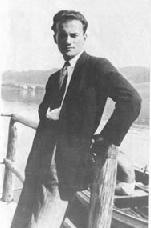
Nikos Skalkottas (1904-1949)

A biography by John G. Papaiouannou Secretary, Society of Skalkottas’ Friends
“A Mozart of our time. . .”1, “. . . a miracle that happened in this country (Greece). . .”2, “. . . a volcanic talent”3, “. . . of the hundreds of my pupils, only a few have become composers: Webern, Berg, . . . Skalkottas . . . (another seven names mentioned)”4. May superlative judgments by important critics are gathered at the Skalkottas Archives in Athens. The tragic fact that a composer of such stature became known to the world at large only posthumously -- something almost inconceivable in the 20th century with its highly efficient ‘information machinery’ -- makes this a unique case in our times.
Nikos Skalkottas was born on March 8, 1904 in Halkis (island of Eubea, Greece). His great- grandfather, Alexander Skalkottas, from Pyrgos (island of Tinos) was a renowned folk singer, violinist and composer; his father, Alexander Skalkottas, was a flutist. A child prodigy himself as a violinist, Nikos pursues his studies first in his home town with his uncle Costas, later at the Athens Conservatory, graduating with the First Prize Gold Medal in 1920. In 1921, on a series of scholarships, he left for Berlin where he stayed until 1933, first taking violin master courses with Willy Hess, then in the winter of 1923-24 turning definitely to composition, for which his main teachers were Philipp Jarnach (1925-27) and Arnold Schoenberg (1927-31). Both teachers thought highly of him.
He composed prodigiously, in a personal atonal idiom, using the 12-tone system rather seldom and somewhat reluctantly at that time. When the mounting wave of Nazism made life for exponents of new music difficult, Skalkottas returned to Athens in May 1933, the same month Schoenberg left Germany. In Greece, unfortunately, Skalkottas met with a lot of incomprehension and enmity, and was obliged to accept a position as one of the last violins in the State Orchestra of Athens. He isolated himself, refusing to talk about music to all but a few people who, he thought, appreciated contemporary music, all the while composing feverishly until his death on September 19, 1949 in Athens, as a result of a neglected constricted hernia. Practically his entire output remained unknown, unpublished and unperformed during his lifetime, and was actually discovered only after his death.
In 1935 he turned to a new, quite complex but highly concise version of the twelve-tone system of his own invention, which he used extensively until his death, parallel with, beginning around 1938, a non- serial method that sounds only slightly different from the other technique. His main innovations consist of creating entirely new sound worlds by developing formal structures operating at multiple concurrent levels, and by the intensity and directness with which he used harmony, counterpoint, rhythm, articulation, etc. to serve maximum expressive purposes.
In his 25-year long creative career, Skalkottas composed more than 170 works, often short, but sometimes of “gigantic” dimensions and of remarkable sophistication and complexity. Manuscripts for over 110 works are gathered at the Skalkottas Archives in Athens, representing more than 80% of his work (since the missing ones are generally quite short).
1 W. Busch, “Musica”, Dec. 1956
2 W. Goehr, “Kathimerini”, 1.XI.1952
3 H.H. Stuckenschmidt, “Frankfurter Allgemeine”, 28.VI.1969
4 A. Schoenberg, “Style and Idea”, New York, 1950. (Schoenberg knew of
Skalkottas’ works until 1933, but never heard about him later.)
Other links
Feinberg -
Skalkottas Society
Article
in the Greek newspaper "TA NEA"
Altavista search
on Nikos Skalkottas
Concerto for 3
bouzoukis and orchestra by N. Skalkottas
Guardian's review
for Skalkottas: Maiden and Death
36 Greek dances for orchestra
by N. Skalkottas
Dimitris Mitropoulos
& Nikos Skalkottas concerto grosso
www.schnittke.de/skalkottas/skalkottas.html
www.sheetmusicplus.com/a/phrase.html/id=50330&phrase=Νikos=Skalkottas
www.composerscollab.org/music≠source/skalkottas-nikos-content.html
Σκαλκώτας
στη Δανία 8/11/2000
ΝΙΚΟΣ
ΣΚΑΛΚΩΤΑΣ 16/12/2000